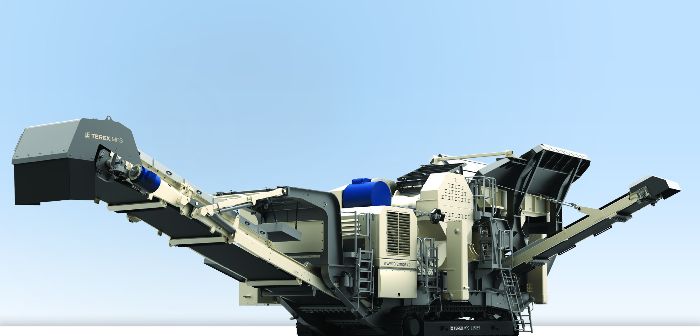When Terex MPS, a global manufacturer of lifting and material processing products, needed a reliable and flexible system to measure stress on its range of stone crushing machines, it turned to HBM to provide a solution. As part of its ongoing research and development of this powerful range, Terex asked HBM to consult on the LJ5139, which will be the largest tracked mobile machine in its range when fully developed.
The challenge
Terex MPS needed a rugged and reliable measuring amplifier system for long-term testing of the LJ5139 Jaw Crusher in a quarry. Uneven surfaces, high-impact forces and dust – the jaw crusher is subject to high loads in a harsh environment, which the amplifier system, too, must withstand.
The rugged SomatXR measuring amplifier system meets these high requirements. It provides reliable test results in harsh environments, even in the case of unforeseen events and loads. Furthermore, no measurement data is lost when using the SomatXR system, even in the event of a power failure – a key aspect to long-term tests.
While Terex MPS previously used rented equipment that was overly susceptible to noise interference and loads, the investment in its own measuring amplifier system has paid off for the company: SomatXR enables Terex to flexibly perform the mobile long-term tests within the scheduled time windows and rely on conclusive results from the vehicle tests.
Uneven surfaces, high impact forces and dust
The issues being faced by the LJ5139 Jaw Crusher that was used in a quarry were varying in nature. With the machine itself weighing up to 110 tonnes, the chassis is subject to high loads when tracking on uneven surfaces.
In addition, the hopper and feeder receives high-impact forces when large stones with a volume of up to 1m3 are dropped from the excavator used to feed it. Moreover, the crusher itself is subject to forces of up to 8,000kN during the crushing process.
“To deal with these issues, we initially made use of finite element analysis during the design process and verified the results in the field using strain gauges. Previously relying on rented equipment, we were keen to invest in our own equipment for increased flexibility,” said Ian Boast from Terex Corporation.
Furthermore, the initial equipment being hired was susceptible to noise interference from surrounding equipment. This was particularly problematic as the loadings in the crusher are often random and transient in nature, which could potentially cause confusion and false results.
In addition to this, the physical environment in the quarry, which is arduous with high levels of dust, not only limits the test options on-site, but also requires extra care to be undertaken with the conventional equipment being used.
Surviving sudden knocks and power failure
After a study of the issues faced, HBM specified its DAQ, SomatXR series, which is particularly suitable for use in harsh environments. To complement this package, HBM also suggested the SomatXR MX1615B-R module and related accessories, which included RF-9 strain gauge rosettes. Given the demanding environment, it was important to choose the correct equipment available.
Often faced with wet and arduous conditions, the ability to operate reliably, despite sudden knocks, was a key consideration. When operating under such extreme conditions, it is also often hard to anticipate all of the problems that may occur, such as losing measurement data due to unforeseen events, such as a power failure.
This is a particularly relevant feature in terms of long-term tests, such as those required by Terex MPS. The SomatXR system enables data to be continuously recorded. This means that should a failure interrupt a test, recorded data up until that point will be saved. This is particularly beneficial as it also means the system should also continue datalogging automatically, after the interruption, without any need for user interaction.
HBM data acquisition systems are suitable for a wide range of mobile testing applications but the immense load requirements and extreme environmental conditions surrounding Terex MPS did present a challenge.
However, thanks to HBM’s extensive experience in mobile testing and demanding fields, it was able to provide a solution that offers Terex MPS the flexibility of being able to work around available and convenient testing windows. In addition to specifying and supplying Terex MPS with a system to meet its needs, HBM also provided engineers with training and support.
“The analysis software that HBM supplied is intuitive and easy to understand; the user friendly visualization module allows us to view live data as it is being recorded on-site. Also we are now able to create custom indicators based on live calculates as we receive live figures of the toggle plate load while the crusher is running,” commented Boast.
“Another helpful feature is that we can continually change the display on the screen while logging, which allows us to monitor each gauge in turn as a full screen graph and we can instantly identify high loads.
“The post-processing capabilities of the software are also very impressive; there are a variety of ways to filter and trim data before exporting in various formats.”


